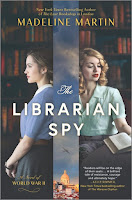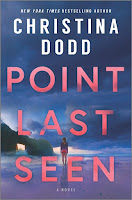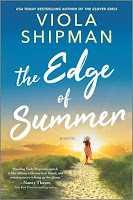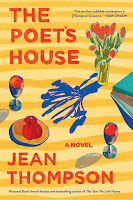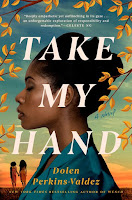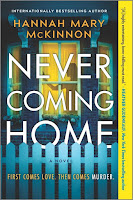Author: Madeline Martin
Publication Information: Hanover Square Press. 2022. 368 pages.
ISBN: 1335427481 / 978-1335427489
Book Source: I received this book through NetGalley and HTP Summer 2022 historical fiction blog tour free of cost in exchange for an honest review.
Opening Sentence: "There was nothing Ava Harper loved more than the smell of old books."
Favorite Quote: "Sometimes the things we hold inside of us need to be let out. No matter where you are or who you're speaking with."
***** BLOG TOUR *****
Review
The title - libraries and spies - draws me to this book. As a reader, I absolutely believe in the power of books to heal and to make a difference. Many histories and stories tell of the role booksellers and libraries played during World War II. This book adds to that canon.However, although one of the main characters is a librarian, the story is not really about libraries or books. Ava is recruited for the war effort because of her literary and linguistic background, but this book is definitely more about the "spy" than the "library." She is recruited to gather newspapers and publications to send back to the United States as intelligence. This includes the papers and journals surreptitiously published by the Resistance.
Only once does the book touch on the power of stories. "Though small, Ava knew the importance of those stories. They were a friend in a foreign, lonely place, a liberation of one's mind from the prison of circumstance, an escape from life's most brutal blows."
The other interesting thing about the title is that it highlights only one of two main characters. Many stories use a two character approach to the narrative, sometimes separated by place, sometimes by times, and sometimes by both. In this case, both Ava and Elaine/Heléne are living through the war. Ava is from the United States but serving in Lisbon. Elaine is in Lyons, France in the heart of the Occupation. I am unsure why the title highlights only one of them although the cover features both, and the narrative alternates chapters between their two perspectives.
Elaine's story - the one of Occupation, Nazi atrocities, and loss - is the more emotional one. Portugal at time is neutral in the war. Ava, though emotionally involved and instrumental in Elaine's story, is still one step removed. Based on the title, I do leave wondering if I see something different in the story than what is intended.
Ultimately, it does not matter what the intent is. The story is a compelling one of courage and of a common cause that unites people whose paths may never otherwise cross. Although I have read much fiction surrounding World War II, each new story introduces me to another aspect of that history - both the atrocities committed and the sacrifices and courage of ordinary people. I have never before read one set in Lisbon. So, I learn the role Lisbon and the Portuguese coastline plays in the war efforts of the Allies.
Make sure and read the author's note at the end that explains the research done and the historical basis behind this fiction. Per the author's note, Ava's character is that one someone who may have been. The creation of Elaine's character is influenced by the little known historic figure of Lucien Guezennec. Again, this leads me back to the original question about why the title focuses on Ava. Regardless, the story keeps me reading from beginning to end, and the history is one I am glad I learned.
About the Book
From the New York Times bestselling author of The Last Bookshop in London comes a moving new novel inspired by the true history of America’s library spies of World War II.Ava thought her job as a librarian at the Library of Congress would mean a quiet, routine existence. But an unexpected offer from the US military has brought her to Lisbon with a new mission: posing as a librarian while working undercover as a spy gathering intelligence.
Meanwhile, in occupied France, Elaine has begun an apprenticeship at a printing press run by members of the Resistance. It’s a job usually reserved for men, but in the war, those rules have been forgotten. Yet she knows that the Nazis are searching for the press and its printer in order to silence them.
As the battle in Europe rages, Ava and Elaine find themselves connecting through coded messages and discovering hope in the face of war.
About the Author
Madeline Martin is a New York Times and international bestselling author of historical fiction novels and historical romance. She lives in sunny Florida with her two daughters, two incredibly spoiled cats and a husband so wonderful he's been dubbed Mr. Awesome. She is a die-hard history lover who will happily lose herself in research any day. When she's not writing, researching or 'moming', you can find her spending time with her family at Disney or sneaking a couple spoonfuls of Nutella while laughing over cat videos. She also loves travel, attributing her fascination with history to having spent most of her childhood as an Army brat in Germany.
Excerpt
April 1943Washington, DC
There was nothing Ava Harper loved more than the smell of old books. The musty scent of aging paper and stale ink took one on a journey through candlelit rooms of manors set amid verdant hills or ancient castles with turrets that stretched up to the vast, unknown heavens. These were tomes once cradled in the spread palms of forefathers, pored over by scholars, devoured by students with a rapacious appetite for learning. In those fragrant, yellowed pages were stories of the past and eternal knowledge.
It was a fortunate thing indeed she was offered a job in the Rare Book Room at the Library of Congress where the archaic aroma of history was forever present.
She strode through the middle of three arches to where the neat rows of tables ran parallel to one another and carefully gathered a stack of rare books in her arms. They were different sizes and weights, their covers worn and pages uneven at the edges, and yet somehow the pile seemed to fit together like the perfect puzzle. Regardless of the patron who left them after having requested far more than was necessary for an afternoon’s perusal.
Their eyes were bigger than their brains. It was what her brother, Daniel, had once proclaimed after Ava groused about the common phenomena—one she herself had been guilty of—when he was home on leave.
Ever since, the phrase ran through her thoughts on each encounter of an abandoned collection. Not that it was the fault of the patron. The philosophical greats of old wouldn’t be able to glean that much information in an afternoon. But she liked the expression regardless and how it always made her recall Daniel’s laughing gaze as he said it.
They’d both inherited their mother’s moss green eyes, though Ava’s never managed to achieve that same sparkle of mirth so characteristic of her older brother.
A glance at her watch confirmed it was almost noon. A knot tightened in her stomach as she recalled her brief chat with Mr. MacLeish earlier that day. A meeting with the Librarian of Congress was no regular occurrence, especially when it was followed by the scrawl of an address on a slip of paper and the promise of a new opportunity that would suit her.
Whatever it was, she doubted it would fit her better than her position in the Rare Book Room. She absorbed lessons from these ancient texts, which she squeezed out at whim to aid patrons unearth sought-after information. What could possibly appeal to her more?
Ava approached the last table at the right and gently closed La Maison Reglée, the worn leather cover smooth as butter beneath her fingertips. The seventeenth century book was one of the many gastronomic texts donated from the Katherine Golden Bitting collection. She had been a marvel of a woman who utilized her knowledge in her roles at the Department of Agriculture and the American Canners Association.
Every book had a story and Ava was their keeper. To leave her place there would be like abandoning children.
Robert floated in on his pretentious cloud and surveyed the room with a critical eye. She clicked off the light lest she be subjected to the sardonic flattening of her coworker’s lips.
He held out his hand for La Maison Reglée, a look of irritation flickering over his face.
“I’ll put it away.” Ava hugged it to her chest. After all, he didn’t even read French. He couldn’t appreciate it as she did.
She returned the tome to its collection, the family reunited once more, and left the opulence of the library. The crisp spring DC air embraced her as she caught the streetcar toward the address printed in the Librarian of Congress’s own hand.
Ava arrived at 2430 E Street, NW ten minutes before her appointment, which turned out to be beneficial considering the hoops she had to jump through to enter. A stern man, whose expression did not alter through their exchange, confronted her at a guardhouse upon entry. Apparently, he had no more understanding of the meeting than she.
Once finally allowed in, she followed a path toward a large white-columned building.
Ava snapped the lid on her overactive imagination lest it get the better of her—which it often did—and forced herself onward. After being led through an open entryway and down a hall, she was left to sit in an office possessing no more than a desk and two hardbacked wooden chairs. They made the seats in the Rare Book Room seem comfortable by comparison. Clearly it was a place made only for interviews.
But for what?
Ava glanced at her watch. Whoever she was supposed to meet was ten minutes late. A pang of regret resonated through her at having left her book sitting on her dresser at home.
She had only recently started Daphne du Maurier’s Rebecca and was immediately drawn in to the thrill of a young woman swept into an unexpected romance. Ava’s bookmark rested temptingly upon the newly married couple’s entrance to Manderley, the estate in Cornwall.
The door to the office flew open and a man whisked in wearing a gray, efficient Victory suit—single breasted with narrow lapels and absent any cuffs or pocket flaps—fashioned with as little fabric as was possible. He settled behind the desk. “I’m Charles Edmunds, secretary to General William Donovan. You’re Ava Harper?”
The only name familiar of the three was her own. “I am.”
He opened a file, sifted through a few papers, and handed her a stack. “Sign these.”
“What are they?” She skimmed over them and was met with legal jargon.
“Confidentiality agreements.”
“I won’t sign anything I don’t read fully.” She lifted the pile.
The text was drier than the content of some of the more lackluster rare books at the Library of Congress. Regardless, she scoured every word while Mr. Edmunds glared irritably at her, as if he could will her to sign with his eyes. He couldn’t, of course. She waited ten minutes for his arrival; he could wait while she saw what she was getting herself into.
Everything indicated she would not share what was discussed in the room about her potential job opportunity. It was nothing all too damning and so she signed, much to the great, exhaling impatience of Mr. Edmunds.
“You speak German and French.” He peered at her over a pair of black-rimmed glasses, his brown eyes probing.
“My father was something of a linguist. I couldn’t help but pick them up.” A visceral ache stabbed at her chest as a memory flitted through her mind from years ago—her father switching to German in his excitement for an upcoming trip with her mother for their twenty-year anniversary. That trip. The one from which her parents had never returned.
“And you’ve worked with photographing microfilm.” Mr. Edmunds lifted his brows.
A frown of uncertainty tugged at her lips. When she first started at the Library of Congress, her duties had been more in the area of archival than a typical librarian role as she microfilmed a series of old newspapers that time was slowly eroding. “I have, yes.”
“Your government needs you,” he stated in a matter-of-fact manner that broached no argument. “You are invited to join the Office of Strategic Services—the OSS—under the information gathering program called the Interdepartmental Committee for the Acquisition of Foreign Publications.”
Her mind spun around to make sense of what he’d just said, but her mouth flew open to offer its own knee-jerk opinion. “That’s quite the mouthful.”
“IDC for short,” he replied without hesitation or humor. “It’s a covert operation obtaining information from newspapers and texts in neutral territories to help us gather intel on the Nazis.”
“Would I require training?” she asked, unsure how knowing German equipped her to spy on them.
“You have all the training you need as I understand it.”
He began to reassemble the file in front of him. “You would go to Lisbon.”
“In Portugal?”
He paused. “It is the only Lisbon of which I am aware, yes.”
No doubt she would have to get there by plane. A shiver threatened to squeeze down her spine, but she repressed it. “Why am I being recommended for this?”
“Your ability to speak French and German.” Mr. Edmunds held up his forefinger. “You know how to use microfilm.” He ticked off another finger. “Fred Kilgour recommends your keen intellect.” There went another finger.
That was a name she recognized.
She aided Fred the prior year when he was microfilming foreign publications for the Harvard University Library. After the months she’d spent doing as much for the Library of Congress, the process had been easy to share, and he had been a quick learner.
“And you’re pretty.” Mr. Edmunds sat back in his chair, the final point made.
The compliment was as unwarranted in such a setting as it was unwelcome. “What does my appearance have to do with any of this?”
He lifted a shoulder. “Beauties like yourself can get what they want when they want it. Except when you scowl like that.” He nodded his chin up. “You should smile more, Dollface.”
That was about enough.
“I did not graduate top of my class from Pratt and obtain a much sought-after position at the Library of Congress to be called ‘Dollface.’” She pushed up to standing.
“And you’ve got steel in that spine, Miss Harper.” Mr. Edmunds ticked the last finger.
She opened her mouth to retort, but he continued. “We need this information so we best know how to fight the Krauts. The sooner we have these details, the sooner this war can be over.”
She remained where she stood to listen a little longer. No doubt he knew she would.
“You have a brother,” he went on. “Daniel Harper, staff sergeant of C Company in Second Battalion, 506th Parachute Infantry Regiment, in the 101st Airborne Division.”
The Airborne Division. Her brother had run toward the fear of airplanes despite her swearing off them.
“That’s correct,” she said tightly. Daniel would never have been in the Army were it not for her. He would be an engineer, the way he’d always wanted.
Mr. Edmunds took off his glasses and met her gaze with his small, naked eyes. “Don’t you want him to come home sooner?”
It was a dirty question meant to slice deep.
And it worked.
The longer the war continued, the greater Daniel’s risk of being killed or wounded.
She’d done everything she could to offer aid. When the ration was only voluntary, she had complied long before it became law. She gave blood every few months, as soon as she was cleared to do so again. Rather than dance and drink at the Elk Club like her roommates, Ava spent all her spare time in the Production Corps with the Red Cross, repairing uniforms, rolling bandages, and doing whatever was asked of her to help their men abroad.
She even wore red lipstick on a regular basis, springing for the costly tube of Elizabeth Arden’s Victory Red, the civilian counterpart to the Montezuma Red servicewomen were issued. Ruby lips were a derisive biting of the thumb at Hitler’s war on made-up women. And she would do anything to bite her thumb at that tyrant.
Likely Mr. Edmunds was aware of all this.
“You will be doing genuine work in Lisbon that can help bring your brother and all our boys home.” Mr. Edmunds got to his feet and held out his hand, a salesman with a silver tongue, ready to seal the deal. “Are you in?”
Ava looked at his hand. His fingers were stubby and thick, his nails short and well-manicured.
“I would have to go on an airplane, I’m assuming.”
“You wouldn’t have to jump out.” He winked.
Her greatest fear realized.
But Daniel had done far more for her.
It was a single plane ride to get to Lisbon. One measly takeoff and landing with a lot of airtime in between. The bottoms of her feet tingled, and a nauseous swirl dipped in her belly.
This was by far the least she could do to help him as well as every other US service member. Not just the men, but also the women whose roles were often equally as dangerous.
She lifted her chin, leveling her own stare right back. “Don’t ever call me ‘Dollface’ again.”
“You got it, Miss Harper,” he replied.
She extended her hand toward him and clasped his with a firm grip, the way her father had taught her. “I’m in.”
He grinned. “Welcome aboard.”
Buy Links
San Marco Books, Signed Copies for Preorders!Story & Song Books, Signed Copies for Preorders!
BookShop.org
Harlequin
Barnes & Noble
Amazon
Books-A-Million
Social Links
Author WebsiteTwitter: @MadelineMMartin
Facebook: @MadelineMartinAuthor
Instagram: @madelinemmartin
Goodreads
Please share your thoughts and leave a comment. I would love to "talk" to you.
